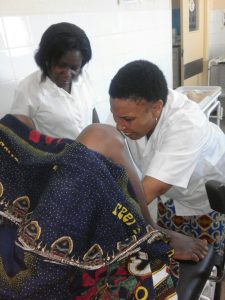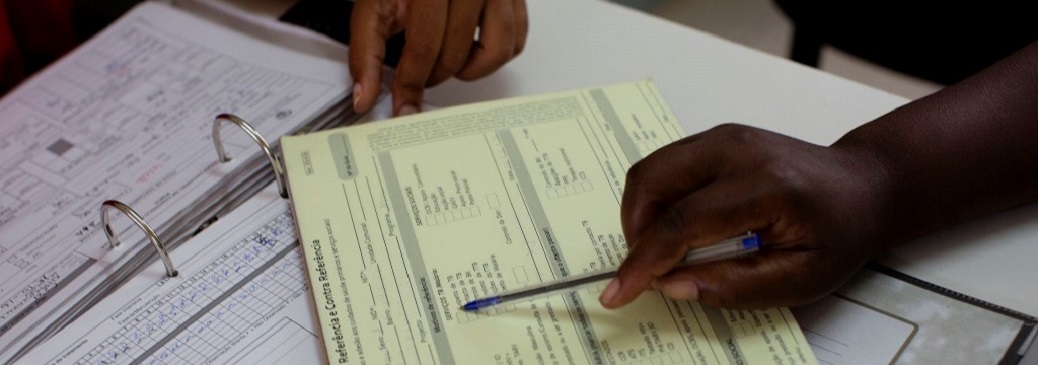Nampula Province, Mozambique – It was almost 8:00 a.m. when Nurse Fátima Cobre heard the wailing of an ambulance approaching Nacala Porto Hospital. Within minutes, it had arrived. As the doors opened, Fátima saw a young woman in labor. She was clearly in pain, weak and tired. Her legs and face were swollen. She was bleeding.
Fátima and her colleagues received the patient and stabilized her in the delivery room. Thankfully, the nurse and relative who had accompanied her brought with them a referral guide, clinical childbirth record, and nursing summary form – all documents completed by staff at the peripheral health unit from where she was referred. They enabled Fátima to quickly confirm a diagnosis of antepartum hemorrhage due to the obstetric complication of placenta previa, and prepare the patient for a cesarean section without delay.
Hemorrhage – alongside pre-eclampsia/eclampsia, obstructed delivery, and other indirect causes, such as HIV/AIDS and malaria – are leading causes of maternal death in Mozambique. While most of these causes are preventable or treatable, progress in reducing maternal mortality is often hampered by shortages in human resources and the need for additional training in the management of obstetric complications.
To address this situation, MCSP is working with the country’s Ministry of Health to empower health care providers like Fátima with the skills and confidence they need to identify complications and make rapid, lifesaving decisions. This includes the ability to correctly record patient data and use information to provide timely and appropriate care to meet the individual’s needs.
In addition to helping to improve patient level data, MCSP is also working with the Ministry of Health to improve how patient data is aggregated and used at the facility, district, provincial and national levels. Through several on the job and patient level trainings, Fátima and her colleagues learned how to fill in register books with concise and consistent data, submit monthly reports, and correctly report aggregate data to the district level who enter into the national level system.

The training sessions stressed not only the need for high-quality data to make the rapid, accurate decisions that can avert preventable mother and child deaths but also correct and accurate reporting to the district level so that decision-makers have access to reliable facility level data to take informed and timely decisions.
As a result, Fátima has noticed significant improvements in the quality and timeliness of her team’s data collection, reporting and registration at all levels. It was this type of documentation that allowed them to take necessary, quick actions when the woman arrived in labor by ambulance.
When the patient and baby later returned for a follow-up visit, Fátima was very happy to see them. “The destiny of the mother and child could have been different,” she said. “Without the skills acquired through MCSP trainings and correctly filling in the fields of the register books, it could be difficult to assess the progress of the labor and to identify the cause of hemorrhage, as well as to manage the situation correctly.”
Zito Alige, Chief Statistician of Nacala Porto District, echoed Fátima’s praise for MCSP support. Since the Program began working in his district, MCSP has assisted Zito and his colleagues in strengthening maternal and child health service delivery, including monitoring and evaluation. The Program provided the necessary technical support at the health facility level for Zito’s staff to collect, process and analyze routine data to go higher up the data chain to the national level.
This process is vital, he said: “If the health facility does not produce reliable information, it may be difficult to identify drug stock-outs or excess.
To date, MCSP has trained 79 health care providers from areas in and around Nacala District, and 5 health facilities out of the 14 health facilities in Nacala Porto have directly benefited from the providers’ expertise. While it’s still early to measure the full impact of the program, results show that different registers tracking patient level data as well as maternal, newborn and child health at the facility and district levels are helping health care providers in Mozambique to make immediate use of data for decision-making — ultimately to improve child health outcomes.

